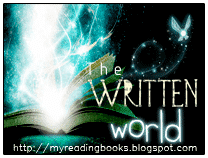
This is the first book in Russel's Moontide and Magic Rise duology. It keeps getting pushed to the side, so it took me a while to get to the end. Not because it was a bad book, just because I am easily distracted.
From the back of the book:
The Age of the Mages is over, and all the secrets of their magical arts are thought to be lost to the world. There are even those who suspect that the last of the great Mages spent their final years scrupulously eradicationg all traces of their art craft from the pages of history - insuring that their art will never practiced again. It is the daw of a new era: an age of reason, science, and exploration, and Tristam Flattery, is one of the most promising young naturalists. But when Tristam is summoned to the royal court of Farrland to try to revitalize a failing species of plant which seems to have mysterious, almost magical, medicinal properties - a plant without which, he is told, the aging king will surely die - he soon realizes that he has been drawn into the heart of a political struggle which spans generations, a conflict which threatens the very foundations of his civilation. And before long, Tristam is caught in the grip of a desting which will lead him to the ends of the known world - on a voyage of discovery that has more to do with magic than with science...
I am embarrassed to say I started this book last month and it was almost the end of August before I finished it. I am the worst at starting more books than I can possibly read, and this month was no exception. So, I started out really well with it, but I left it near completed for a couple weeks before I finally sat down and read it.
I took a fantasy course in university, and one of the things we would talk about is the level of fantasy presented in a novel marketed as one. When you really think about it, any novel can be considered a fantasy as long as it is a fabrication of the author and not a true story, but Sean Russell's book does have some fantasy present. If you had to chose, though, whether it was a high fantasy (like Lord of the Rings, for example) or a low fantasy, I would have to say it was a low fantasy. It is on a made-up world, and while there are hints of possible fantastic things that could happen, not much of them actually occur. To be honest, it reminds me of Darwin, just on a planet other than earth.
The novel follows the very naive Tristam Flattery on his adventures. Tristam is not your typical hero, he is actually a naturalist (Darwin connection) who is sent on a voyage to locate a plant called Kingsfoil, which the King of their homeland needs to survive. His supply has run out, and if the voyagers do not find some soon, it might be their fault if he dies. The book is about 600 pages, and I felt like most of the book took place on a ship, but it didn't really. I know it is a shorter book by some standards, but a lot happens in it. Flattery originally tries to aid the King at home, but when he fails to see how to grow more of the plant, desperate measures must be taken
Flattery is the... fantastic character in the novel. At first, his amazing abilites are not even apparent, but as the novel carries on you start to see that he is not like the rest of the people on the voyage. He seems to have a strong communion with nature, and that nature aids him in the most amazing ways. Since he was just beginning to understand his abilites in this novel, I would think that the second book would become even more fantastic. Tristam might in fact be a mage, a race that was thought to be destroyed.
I look forward to reading the second book in this duology soon, so as to see what further adventures Tristam embarks on and to further understand exactly what his abilities are.
3.5/5
Posted by
Kailana

1 comments:
I read the prequel duology (The Compass of the Soul and Beneath the Vaulted Hills) a year or two before even finding out that this later book existed, and I have to say, I think the prequel is better written. It has an inevitable, sad ending, but it is well written.
Sean Russell's Swans' War trilogy (starting with The One Kingdom) is also very good, maybe better. (What can I say? I'm biased towards books with good endings, or at least not really bad endings.) He states on his web site that he was trying to write a high fantasy that wasn't derivative of Tolkien, and I think he succeeds at that. As I read more about Tolkien, though, I think his world may have more depth than Russell's, where time seems to have stopped for a thousand years--almost everything important seems to have happened in the forgotten past or after the story begins. Anyway, I really like the story, and I recommend it if you liked any of his other books. Just bear in mind that his trilogy and duologies are best read as a single unit, not as separate books.
Post a Comment